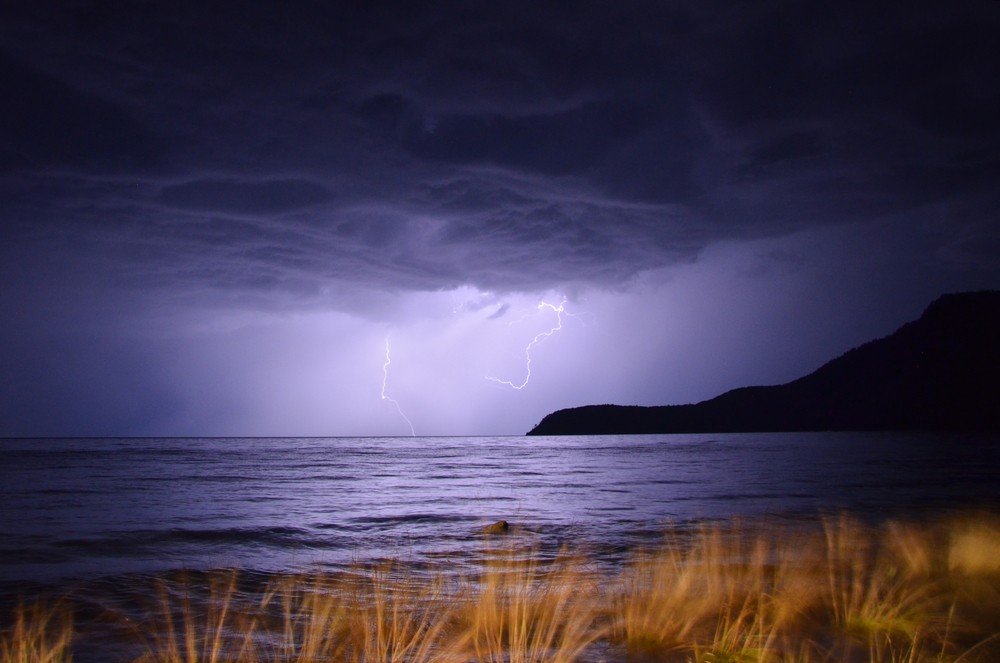Sustainable back up power options
In an increasingly unpredictable world, energy resilience has become a critical consideration for communities looking to maintain access to power during emergencies.
As climate change leads to more frequent extreme weather events, the risk of power outages in our communities grows.
This is underscores the importance of reliable energy solutions that minimise our reliance on petrol and diesel generators.
We often get calls from customers asking us to install large diesel generators to provide back up power. In the past, this was the go to option.
Now we have access to a range of different options, that can all be designed and tailored to your circumstances.
Get in touch for a quote for either an off grid set up or a back up power supply to keep the lights on during the next storm or power cut.
Electrical storm over a lake
Energy resilience and community
Energy resilience is not just about keeping the lights on—it's about ensuring the safety, comfort, and continuity of services within our communities.
Access to power during emergencies can make a significant difference, allowing critical infrastructure such as healthcare, communication, and community shelters to function effectively.
Building resilient energy systems fosters community cohesion and supports a collective response to climate change.
However, it is also important to ensure that those solutions are not also contributing to a changing climate and more natural disasters.
Here are our favourite back up power options.
Why not a generator?
While generators have traditionally been used as a backup power source during outages, relying solely on them presents several drawbacks.
Reliability is a key concern; generators require regular maintenance and can be prone to mechanical failures, especially if not properly serviced.
Additionally, the cost of fuel can be prohibitive, with prices subject to fluctuations and the need for constant refueling during extended outages.
Generators also emit pollutants, contributing to air pollution and undermining climate change efforts.
Furthermore, their noise can be disruptive, particularly in residential areas.
By integrating renewable energy solutions like solar and battery storage with small backup generators, communities can reduce reliance on fossil fuels, lower costs, and enhance overall energy resilience in a more sustainable way.
Here are our favourite options:
Option 1: electric car batteries (with Vehicle to Load)
Electric vehicles (EVs) offer more than just reduction in emissions—they can also serve as backup power sources.
Some modern EVs are equipped with V2L capabilities, allowing their batteries to supply power to homes during outages. This option can provide a temporary power supply for essential appliances, keeping the community connected and secure during short-term disruptions.
Charging an electric car with vehicle to load
Pros:
Utilises existing EV technology without additional infrastructure.
Offers flexibility and mobility, as EVs can be charged elsewhere and then supply power back at home.
Cons:
Limited by the battery capacity of the vehicle and its primary function as transportation.
Best suited for short-term power to keep a few key appliances running, rather than long term back up power solution.
Option 2: Home battery
Solar panels paired with battery storage offer a sustainable solution for energy resilience.
During normal operation, solar systems can reduce reliance on grid power, and in emergencies, battery storage can provide backup power. However, there are challenges to consider:
Pros:
Sustainable and environmentally friendly, utilising renewable energy sources.
Reduces ongoing energy costs and reliance on fossil fuels.
Cons:
Initial setup costs can be high, and sizing the system for sufficient backup capacity requires careful planning.
Limited effectiveness during prolonged cloudy or stormy periods without additional power sources.
Option 3: a hybrid inverter with a small backup generator
For robust and reliable energy resilience, we recommend a hybrid inverter system coupled with a backup generator as needed.
A hybrid inverter integrates solar panels, battery storage, and grid power, seamlessly transitioning to backup energy sources during outages.
When renewable energy sources aren't available, a generator can provide supplemental power to the battery, ensuring continuous operation.
Pros:
Offers a comprehensive and flexible solution for both short-term and long-term outages.
Reduces generator runtime and fuel consumption by prioritizing renewable and stored energy.
Cons:
Requires additional equipment and planning but delivers enhanced reliability.
Environmental footprint depends on the type of generator and fuel used, but this can be minimised with clever planning.
Conclusion
Energy resilience is vital for maintaining community security and well-being during emergencies.
It’s essential to prioritise solutions that address climate change and reduce reliance on petrol and diesel generators.
By adopting renewable-based systems like V2L technology, solar and battery backups, and hybrid inverters, we can empower community resilience, while also supporting a more sustainable energy future.
At This is Electric, we're ready to help you explore and implement energy resilience measures tailored to your needs.
Together, we can build stronger, more resilient communities and mitigate the impacts of climate change.
Reach out to us for guidance on creating your backup power strategy and ensuring your community is prepared for whatever comes next.



